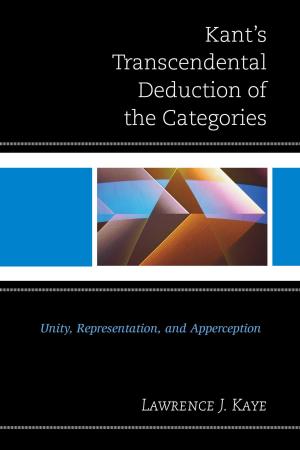Forms of Fanonism
Frantz Fanon's Critical Theory and the Dialectics of Decolonization
Nonfiction, Social & Cultural Studies, Political Science, Politics, History & Theory, Social Science| Author: | Reiland Rabaka | ISBN: | 9780739140352 |
| Publisher: | Lexington Books | Publication: | March 8, 2010 |
| Imprint: | Lexington Books | Language: | English |
| Author: | Reiland Rabaka |
| ISBN: | 9780739140352 |
| Publisher: | Lexington Books |
| Publication: | March 8, 2010 |
| Imprint: | Lexington Books |
| Language: | English |
When Frantz Fanon's critiques of racism, sexism, colonialism, capitalism, and humanism are brought into the ever-widening orbit of Africana critical theory something unprecedented in the annals of Africana intellectual history happens: five distinct forms of Fanonism emerge. Forms of Fanonism: Frantz Fanon's Critical Theory and the Dialectics of Decolonization is discursively distinguished from other engagements of Fanon's thought and texts insofar as it is the first study to consciously examine his contributions to Africana Studies and critical theory or, rather, the Africana tradition of critical theory. Forms of Fanonism identifies and intensely analyzes Fanon's contributions to the deconstruction and reconstruction of Africana Studies, radical politics, and critical social theory. In highlighting his unique 'solutions' to the 'problems' of racism, sexism, colonialism, capitalism, and humanism, five distinct forms of Fanonism materialize. These five forms of Fanonism allow contemporary critical theorists to innovatively explore the ways in which his thought and texts can be dialectically put to use in relieving the wretched experience of this generation's wretched of the earth. Critics can also apply these forms to deconstruct and reconstruct Africana Studies, radical politics, and critical social theory using their anti-imperialist interests. Throughout Forms of Fanonism, Reiland Rabaka critically dialogues with Fanon, incessantly asking his corpus critical questions and seeking from it crucial answers. This book, in short, solemnly keeps with Fanon's own predilection for connecting critical theory to revolutionary praxis by utilizing his thought and texts as paradigms and points of departure to deepen and develop the Africana tradition of critical theory.
When Frantz Fanon's critiques of racism, sexism, colonialism, capitalism, and humanism are brought into the ever-widening orbit of Africana critical theory something unprecedented in the annals of Africana intellectual history happens: five distinct forms of Fanonism emerge. Forms of Fanonism: Frantz Fanon's Critical Theory and the Dialectics of Decolonization is discursively distinguished from other engagements of Fanon's thought and texts insofar as it is the first study to consciously examine his contributions to Africana Studies and critical theory or, rather, the Africana tradition of critical theory. Forms of Fanonism identifies and intensely analyzes Fanon's contributions to the deconstruction and reconstruction of Africana Studies, radical politics, and critical social theory. In highlighting his unique 'solutions' to the 'problems' of racism, sexism, colonialism, capitalism, and humanism, five distinct forms of Fanonism materialize. These five forms of Fanonism allow contemporary critical theorists to innovatively explore the ways in which his thought and texts can be dialectically put to use in relieving the wretched experience of this generation's wretched of the earth. Critics can also apply these forms to deconstruct and reconstruct Africana Studies, radical politics, and critical social theory using their anti-imperialist interests. Throughout Forms of Fanonism, Reiland Rabaka critically dialogues with Fanon, incessantly asking his corpus critical questions and seeking from it crucial answers. This book, in short, solemnly keeps with Fanon's own predilection for connecting critical theory to revolutionary praxis by utilizing his thought and texts as paradigms and points of departure to deepen and develop the Africana tradition of critical theory.















